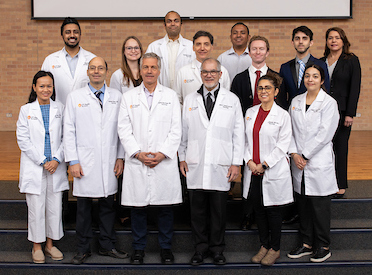UT Epilepsy Division
Who Are We?
The Division of Epilepsy consists of seven faculty members. The epilepsy faculty were recruited from several nationally recognized epilepsy fellowship programs, including the Cleveland Clinic Foundation (Drs. Koneru and Szabo), Case Western University (Dr. Bui, University of California (Dr. Morgan), Duke University (Dr. Cavazos), and University of Washington (Dr. Lie). Our faculty are seeing patients at the MARC and UHS Neurology Clinic, cover the inpatient epilepsy monitoring unit (EMU), and in- and outpatient electroencephalography (EEG) services. Dr. Szabo is also attending at Tuberous Sclerosis Clinic under the direction of Dr. Leary, pediatric epileptologist.
The flagship of the epilepsy program is the South Texas Comprehensive Epilepsy Center (STCEC). The STCEC is a multidisciplinary affiliation of adult and pediatric epileptologists, epilepsy surgeons, dietician, and neuropsychologists, working in conjunction with UH outpatient and inpatient nursing and, most importantly, with the technical staff at the Neurodiagnostic Center. The STCEC joined the National Association of Epilepsy Centers (NAEC) in 2008 with the highest, Level 4, accreditation. The NDC became certified by the American Board of Registration of EEG Technologists (ABRET) in 2015.
Why Chose Us?
The epilepsy program at the STCEC is focused on providing the best care based on nationally accepted practice guidelines. Epilepsy specialists confer with the epilepsy surgeons, neuropsychologists, and neuroradiologists to offer the best individualized surgical approach for qualified patients. The specialists are all subspecialty boarded, most with over 10 years of professional experience. Experience with patients and cutting-edge technologies are especially important for the selection and successful treatment of patients. Our epilepsy surgery program has treated over 600 adults and children with medically intractable epilepsies since 1996. As a comprehensive multi-disciplinary center, the STCEC not only offer surgical services, but also clinics providing ketogenic therapies and a coordinated care model for Tuberous Sclerosis patients.
Innovation:
The STCEC provides leading edge care utilizing the newest technological advancements for epilepsy surgery or neurostimulation. UT Health San Antonio has been the pioneer of epilepsy surgeries, performing the first intracranial EEGs with grid and depth electrodes as well as stereotactic EEG electrodes in adults and children, the first laser ablations, and implanted the first responsive and deep brain stimulators in San Antonio and South Texas. The STCEC also has one of the most active VNS implantation/reimplantation programs in the country. Finally, Dr. Leary spear-headed the re-establishment of the Ketogenic Diet program at University Hospital, with the opportunity of treating patients of all ages.
Our neurospsychologists serving the epilepsy community, Drs. Amy Werry and Johanna Messerly, have established self-management programs for people with psychogenic nonepileptic spells as well as for epilepsy patients suffering from cognitive deficits. These programs represent truly innovative approached to patient care.
Research:
Our research program offers clinical trials and innovative research for patients with medically refractory epilepsies. Our faculty have been engaged in several inpatient and outpatient clinical trials, including Phase 2 and 3 medication trials as well as post-marketing medication and device studies. The inpatient studies were multicenter studies evaluating interventions for status epilepticus.
Our center has been involved in the multicenter Human Epilepsy Project (HEP) observational studies on people with focal (HEP 1&2) and generalized epilepsies (HEP 3), the latter recently securing NIH funding. We also participate in the UT Consortium evaluating the efficacy of wearable devices to detect seizures. We are also participating in a multicenter study looking at clinical biomarkers of sudden unexpected death in epilepsy (SUDEP).
Our faculty have research interactions with researchers from several local institutions including our own Research Imaging Institute, Texas Biomedical Research Institute, University of Texas San Antonio, University of Texas Rio Grande Valley and Children’s Hospital of San Antonio.
Education:
Our program offers one-year positions in Epilepsy (Dr. Lie) and Clinical Neurophysiology (Dr. Koneru). Each fellowship year focuses on clinical and procedural skills and offers the opportunity to participate in clinical research and anti-seizure medication trials.
Dr. Szabo revamped the Southern Epilepsy and EEG Society, representing elite epilepsy surgery centers in the Southern states, and UT Health’s CME Department has been running the annual meetings for the last decade.
Community:
For the last 25 years, the STCEC physicians have enjoyed a close interaction with the Epilepsy Foundation of Central and South Texas (EFCST). Our faculty are engaged in outreach clinics sponsored by the Epilepsy Foundation of Central and South Texas, supporting the underserved communities of Corpus Christi, Laredo, and Uvalde, even San Antonio. Our faculty offer educational talks and have hosted meetings for the EFCST clients and the wider medical community.
What We Treat:
*Focal epilepsy (temporal, frontal, parietal, occipital lobe epilepsy as well as insular, cingulate and peri-Rolandic epilepsies)
*Idiopathic Generalized Epilepsy
*Lennox-Gastaut Syndrome
*Dravet Syndrome
*Epilepsies of various etiologies
*Genetic epilepsies
*Autoimmune epilepsies
*And other acquired epilepsies due to stroke, trauma, developmental, infectious diseases, degenerative, tumors, vascular malformations)
*Psychogenic nonepileptic spells
*Cognitive and behavioral complications of epilepsy
Give to the Epilepsy Program
Your financial contribution enables us to provide life-changing services, including treatments and research.
Contact Us
To learn more about the Epilepsy Program available at UT Health San Antonio or to schedule an appointment, please call 210-450-9700
Refer a Patient
Submit an online referral form or call our 24-hour referring physician service 210-450-9700. Our program also evaluates people with epilepsy referred directly to the Epilepsy Monitoring Unit at University Hospital; please call (210) 358-1587.


